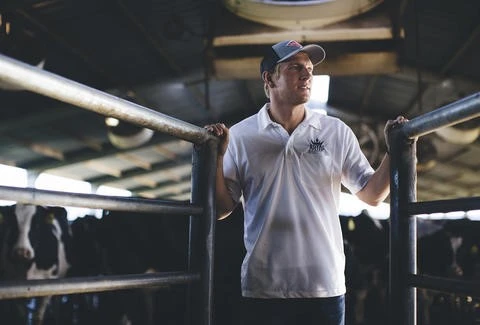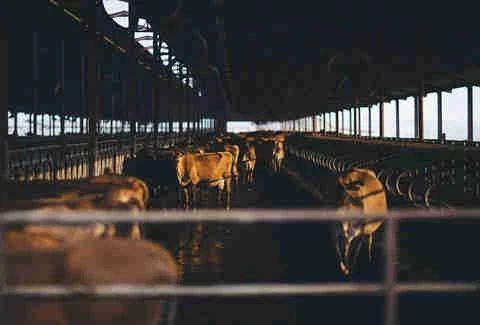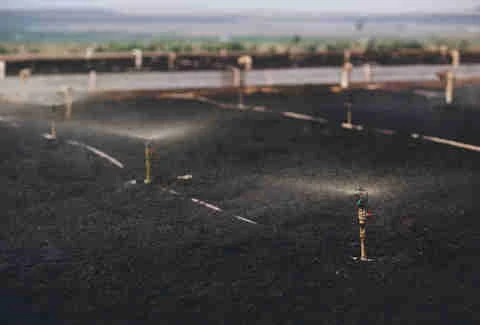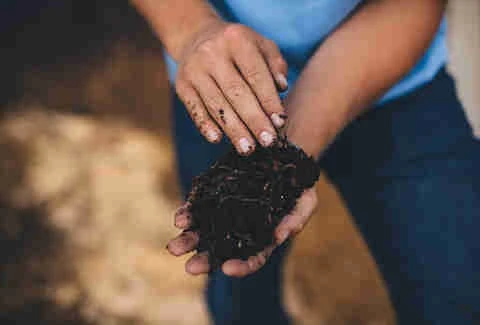This Farmer Won a Sustainability Award Thanks to Biofilters
Using less water and creating bio-rich soil sounds like a job for environmentalists or engineers, but dairy farmer Austin Allred is renowned for biofiltering the soil on his dairy farm.
THIS FARMER TURNS MANURE INTO CLEAN WATER AND IT MAY BE THE FUTURE OF FARMING
By DAN MORGRIDGE PUBLISHED ON 06/11/2018
PHOTOS COURTESY OF AUSTIN ALLRED
Austin Allred is so devoted to dairy farming that he switched over to it after growing up as a crop farmer. He now runs Royal Dairy, located in central Washington, where cows are a powerful tool in an astonishing process that creates bio-rich soil and clean irrigation water while cutting down greenhouse gases. That’s because as much as Royal Dairy cares about what goes into the cows, visitors will quickly realize that their operation is equally concerned with what comes out of them. And if you think the only answer to that is “milk," then Allred and his team are ready to open your eyes even as you pinch your nostrils. Turns out there’s gold in them thar cow pies. Food for thought
Allred feels that cows are underappreciated for “the incredible miracle of their digestive system.” Before dairy farming, he used to grow potatoes, apples, and cherries -- now, he uses that knowledge and those connections to other crop farmers to ensure his herd gets an optimized diet. Their feed comes from a variety of sources: everything from corn and alfalfa to grape pomace leftover from winemaking are good for bovine stomachs, which are a better destination for it than landfills. Sometimes those lucky cows even get french fries as a treat. A cow’s digestive system is able to equalize those ingredients into nutrients that enrich soil in a way the uneaten product, if composted, would not.
“Those cows are able to take all those different starches and fats and sugars and essentially ‘pull the glove’ off,” he says, describing how the animals break down the tough fibers and macronutrients so that time and weather don’t have to. “There’s not technology even remotely close to being able to do that -- as advanced as we are, we can’t come close to what the cow’s gut can do. To not only produce milk, but to produce plant food. The cow does the hard work -- transforming those proteins and sugars into nitrogen, phosphate, organic matter.”
Not that Allred doesn’t do hard work, too. His job -- or as he puts it, his responsibility -- is to extract that chemical goodness in an energy-efficient manner, with as little waste as possible, to give plants a powerhouse meal that charges up their growth. So how does the farm turn stinky cow manure into clean irrigation water?
PHOTOS COURTESY OF AUSTIN ALLRED
Miraculous alchemy
It’s not by using more water, though you’d be forgiven for assuming so. To most people, cow manure equals fertilizer. Take it, put it back into the fields, and you’ve got the circle of life, right? What we non-farmers don't realize is that manure and manure water are actually so nutritious for plants as to be damaging. Plants can experience something called “nutrient burn” -- the plant equivalent of devouring a feast without a single glass of water to wash it down. If plants get too many nutrients, the excess that they don’t use can affect pH levels in the soil, cause irregular growing, and many other problematic behaviors depending on the particular plants and nutrients.
“If you think of the word ‘byproduct,’ it’s not always a bad thing -- in the ag[ricultural] world, a lot of companies make more money on their ‘byproducts’ than they do on their ‘products’ -- that’s the same thing the cows are doing. There’s this huge focus on cow’s production of methane and byproducts -- but those are plant food. We just gotta process them.”
That processing strips the manure of its 90% water content, separates the nutrients for later use, and also traps gases like ammonia for a three-way win. That manure water is then clean enough for use around the farm, no longer a byproduct but essential contribution to the farm. Pretty neat trick, harvesting the best parts of manure while actually generating millions of gallons of water instead of using it for dilution.
PHOTOS COURTESY OF AUSTIN ALLRED
Enter the biofilter
While too many nutrients sounds like a good problem to have, it is still a problem. And the best way to fix a good problem? Make it the solution for some other need. In fact, it’s literally a solution, because Royal Dairy balances out the pH of the irrigation water using techniques cribbed from Mother Nature herself. Allred and company have put the essential materials for that circle of life in a tight circuit to purify their product in very little time or energy.
“The process of the biofilter is simple -- it’s how the Earth works,” says Allred. “You get some water that might be contaminated. That water settles through the top soil, through a rock layer, and by the time we’re pulling it out of the wells to shower with, it’s clean again. So for our biofilter -- we just condense that. We add some more biology, some more rocks... make it more efficient.”
"WE HAVE TO MAKE SUSTAINABLE DECISIONS IF WE WANT TO STAY IN BUSINESS.”
The biofilter process starts at a low spot on the compound -- a place where all the water that runs off from cows, from cleaning, from cooling machinery, and anything else can gather. A few simple mechanical screens gather the solid waste so that only the “brown water” moves forward. A series of sprinklers takes this water and spreads it across a series of long concrete troughs -- basically swimming pools -- filled with granite. The granite acts as a denitrifier -- it pulls out the methane and the ammonia, converting greenhouse gases into benign nitrogen. (But don’t think that methane and ammonia are out of the picture, just trapped where they can be handed over to the plants who love them.)
“It’s taking the same technology that we see happening every day, isolating that, and essentially making it smaller,” he says. ”It’s really incredible what it’s doing, but it’s not complicated.”
At this point wood chips absorb the liquid, and the many worms and microbes living in them feast on the nutrient-rich soup. After that feeding frenzy, the water that comes out is clean enough to put back on the fields for successful irrigation -- all without any chemical additives or unused byproducts. Even the worm casings (the professional term for worm poop) is usable as a fertilizer product that might get sold right back to an apple orchard.
PHOTOS COURTESY OF AUSTIN ALLRED
Neighborly behaviors
The economical and ecological benefits are obvious, but there's another you can't see so much as smell. You might think this poop-to-poop conversion makes for some stinky times, but Royal’s process means it actually keeps a lower profile on the olfactory landscape than the average dairy farm. That’s nice news for Allred’s neighbors’ noses. And since it’s all fairly passive, he ends up with more time on his hands than if he were managing waste the old way. That’s nice news for him.
Right now, Allred is the only dairy farmer in Washington State using these practices -- and one of just a handful in the country. But far from keeping this more efficient system of production to themselves, Allred and his team are excited to spread the word about the biofilter and what it can offer to other farmers. Their enthusiasm for sustainability comes from both economical and ecological reasons -- something he stresses during the hundreds of tours he’s given on his farm. And since he just won the Outstanding Dairy Farm Sustainability award at the 2018 U.S. Dairy Sustainability Awards, people are listening.
“In order for us to be successful in the long term, our practices have to be sustainable,” he emphasizes. “We are committed to that sustainability because I’m 28, I have a 4-year-old and a 2-year-old, and we need to be here a long time. We need to take care of our land, we need to take care of our cows, our employees -- we have to make sustainable decisions if we want to stay in business.”
It seems paradoxical. Royal Dairy can only draw these environmental benefits by disseminating their business advantage to others. But some things are more valuable than next quarter’s earnings. Thankfully, in Allred the far-reaching profit has found its far-reaching prophet.
Article originally published on Thrillist.com



















